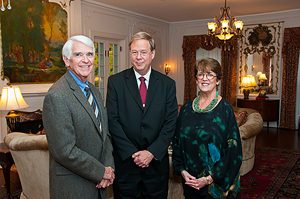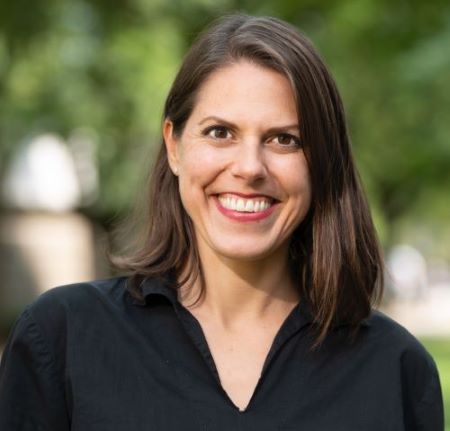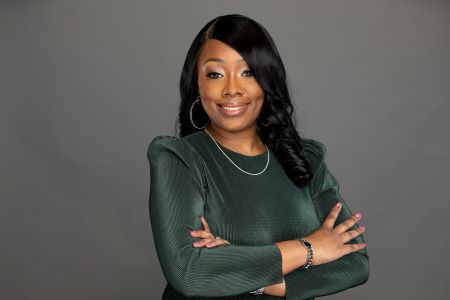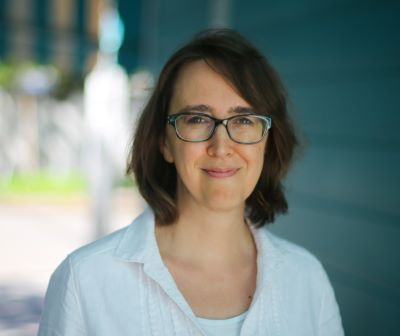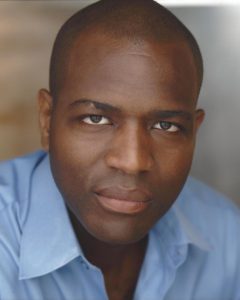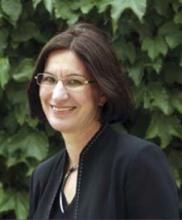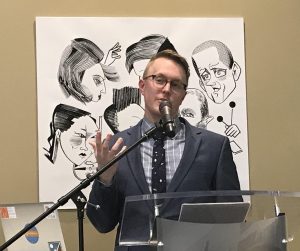Edward (ADL ‘64, MED ‘68) and Melinda Melton (FSM ‘66) Sadar established the Edward S. and Melinda Sadar Lecture in Writing in the Disciplines in Spring 2009 to showcase research and scholarship in writing across the disciplines, including the histories, cultures, and contexts of specific writing practices, writing instruction, and communicative technologies. The lecture is held annually.
“Automating Writing from Androids to AI”
A Lecture by Annette Vee
Tinkham Veale University Center Senior Classroom
Monday, December 11th, 2023, 3:15—4:30pm (reception following)
Generative AI platforms such as ChatGPT have suddenly thrust the automation of writing into the public spotlight. The machine learning techniques behind Large Language Models such as the GPT series may be new; however, for centuries, humans have attempted to automate writing using mechanical, spiritual, and logical means. The automation of writing parallels a longer history of automation, yet with a twist: each of these attempts to automate writing also implicated a kind of artificial human intelligence. Writing is uniquely human, and as such, it has served as a touchstone for scientific and literary imaginations focused on replicating human intelligence. This presentation puts current conversations about AI writing in historical context with 18th century automata, 19th century spiritualists, and 20th century computer scientists to probe both what writing meant in previous eras as well as dominant assumptions of what it meant to be human in these eras.
Annette Vee is Associate Professor of English and Director of the Composition Program at University of Pittsburgh, where she teaches undergraduate and graduate courses in writing and digital composition. She is the author of Coding Literacy: How Computer Programming is Changing Writing (MIT Press, 2017), and co-editor of TextGenEd: Teaching with Text Generation Technologies (WAC Clearinghouse, 2023). She has published on computer programming, blockchain technologies, intellectual property, and AI-based text generation. Her current book project, Automating Writing from Androids to AI, examines why and how humans have sought to automate writing across history.
“Linguistic Justice: Black Language, Literacy, Identity, and Pedagogy”
A Lecture by April Baker-Bell
Location TBA
Friday, December 2nd, 2022, 3:15 to 4:30 p.m. (reception following)
In this talk, Dr. April Baker-Bell will discuss how anti-Black linguistic racism and white linguistic supremacy get normalized in teacher attitudes, curriculum and instruction, pedagogical approaches, disciplinary discourses, and research, and she will discuss the impact these decisions have on Black students’ language education and their linguistic, racial, and intellectual identities. Dr. Baker-Bell will introduce a new way forward through Antiracist Black Language Pedagogy, a pedagogical approach that intentionally and unapologetically places Black Language at the center to critically interrogate white linguistic hegemony and anti-Black linguistic racism.
April Baker-Bell is an award-winning transdisciplinary teacher-researcher-activist and associate professor of language, literacy, and English education in the Department of English and Department of African American and African Studies at Michigan State University. Baker-Bell is an international leader in conversations on Black Language education, and her research interrogates the intersections of Black Language and literacies, anti-Black racism, and antiracist pedagogies. Her award-winning book, Linguistic Justice: Black Language, Literacy, Identity, and Pedagogy, brings together theory, research, and practice to dismantle Anti-Black Linguistic Racism (a term Baker-Bell coined) and white linguistic supremacy. Baker-Bell’s latest research project involves collaborating with healthcare scholars and researchers to develop, implement and study antiracist medical curriculum interventions that support medical professionals with developing an antiracist praxis for confronting and reducing racial bias and anti-Black racism in medical and healthcare institutions. Baker-Bell is the recipient of many awards and fellowships, including the 2021 Coalition for Community Writing Outstanding Book Award, the 2021 Andrew W. Mellon Foundation’s New Directions Fellowship, the 2021 Michigan State University’s Community Engagement Scholarship Award and the 2021 Distinguished Partnership Award for Community-Engaged Creative Activity, the 2020 NCTE George Orwell Award for Distinguished Contribution to Honesty and Clarity in Public Language, the 2020 Theory Into Practice Article of the Year Award, the 2019 Michigan State University Alumni Award for Innovation & Leadership in Teaching and Learning, and the 2018 AERA Language and Social Processes Early Career Scholar Award.
“Constance Fenimore Woolson: The Story of her Revival and Why the Recovery of Nineteenth-Century
Women Writers Matters”
A Lecture by Anne Rioux
Clark 206
Friday, April 8th, 2022. 3:15 to 4:15 (reception following)
Constance Fenimore Woolson (1840-1894) is a name that all students of American literature should know, yet she has been left out of the stories that we tell about our literary past. Both a regionalist and a realist, both a writer of “woman’s fiction” and male-oriented stories, both a popular and a critically acclaimed writer, she has fallen through the cracks. But in recent years, many readers inside and outside of academia have discovered the powerful work of this remarkable writer, who remains difficult to categorize. What is at stake in her recovery and that of other nineteenth-century women writers who have been forgotten? Why does the recovery of women writers (still) matter both in the college classroom and in the wider culture? How can we ensure that Woolson and other rediscovered writers are not forgotten again?
Anne Boyd Rioux is the author of three books, including the biography Constance Fenimore Woolson: Portrait of a Lady Novelist (Norton 2016), one of the Chicago Tribune‘s ten best books of the year, and the Indie bestseller Meg, Jo, Beth, Amy: The Story of Little Women and Why It Still Matters (Norton 2018). She has also edited four books, including two editions of Woolson’s stories, one published by the Library of America and one published by Norton. She has been an English professor at the University of New Orleans for 22 years and is the recipient of four National Endowment for the Humanities awards, two for public scholarship.
“Say They Name in Black English: George Floyd, Breonna Taylor, Atatiana Jefferson, Aura Rosser, Travon Martin and the Need to Move from College Writing Instruction and Toward Black Linguistic Arts
Lecture by Vershawn Ashanti Young
Friday, April 30, 2021 ~ 3:15 – 4:30 p.m. (EDT)
RSVP for Zoom Webinar Link
In this talk, dr. vay, past chair of Conference on College Communication and Composition (2018 to 2021), asks audiences to review the “Know Their Names: Black People Killed By The Police in the USA” (found here https://interactive.aljazeera.com/aje/2020/know-their-names/index.html) prior to his talk.
dr. vay’s address will argue that the exclusive focus on writing and standard language ideology in First Year Composition replicates and fosters state-sanctioned violence against Black peoples. Drawing on American history, discourses of composition studies, the attempts to make comp/rhet only about writing, and current calls for Black linguistic justice, dr. vay will provide other rhetorically- and linguistically based options that instructors must use to inform their literacy pedagogies geared away from racial domination and toward liberation of Black peoples, they bodies, they tongues, and they socio-cultural performances.
Vershawn Ashanti Young, who goes by dr. vay, has been writing for newspapers and magazines for almost twenty years. Two of his most recent pieces have been on the white-to-black racial passing of a Jewish college professor and on the controversial use of the Nword. This latter piece was reprinted in the magazine of Canadian Association of University Teachers. dr.vay is a solo performance artist. At the University of Waterloo in Ontario, Canada, he is the program development chair of Black Pan African and Diaspora Studies and a professor in the departments of Communication Arts and English Language and Literature. He is the author or coauthor of ten books, including This Ain’t Yesterday’s Literacy: Culture and Education After George Floyd (Fountainhead Press, 2021), which has been adopted as a common reader at several universities. He is also coauthor of Other People’s English (Parlor Press, 2019), The Routledge Reader of African American Rhetoric (Routledge, 2018), and Neo-Passing: Performing Identity After Jim Crow (University of Illinois Press, 2018). He is currently the chair of the Conference on College Composition and Communication (CCCC), the largest educational organization dedicated to college literacies of communication.
“International Authorship, Trans-Atlantic Publishing, and the ‘English Tolstoy’”
Lecture by Kathy Bowrey
Dampeer Room, Kelvin Smith Library
October 4th, 2019
This year’s Sadar Lecture is dedicated to Martha Woodmansee, Professor Emerita of English and Law, whose retirement in June 2019 we honor with this event.
In the early twentieth century English language publishers became multi-national, with head offices in London and New York servicing branch offices across the major cities of nations of the British Commonwealth. This structure arose from Trans-Atlantic copyright advocacy fronted by a popular Victorian romancer, Thomas Henry Hall Caine (1853-1931), who was celebrated in the press as “the English Tolstoy.” Caine’s campaign centered on promoting the utopian idea of copyright as a natural right on a speaking tour across Canada and America in 1895. Officially, Caine also spoke as representative of the British Society of Authors. Unofficially, he acted on behalf of the British Parliament and Colonial Office, and in consultation with his American publisher, William Appleton, Chairman of the American Publishers’ Copyright League. Caine’s mission was to repress Canadian copyright sovereignty in order to prevent the unravelling of British-American international copyright supremacy secured by the Chace Act of 1891. This presentation explores why international authorship is imperial by design and the consequences for authors and readers in former colonies, including Australia, New Zealand and Canada.
Dr. Kathy Bowrey is a Professor in the Faculty of Law at the University of New South Wales in Sydney, Australia. She is a legal historian with broad socio-legal interests. Her research focuses on the laws and practices that inform knowledge creation and the production, distribution, and reception of culture and technology. Professor Bowrey is Co-Director of the International Society for the History and Theory of Intellectual Property (ISHTIP), established in 2008. Her talk is drawn from a chapter in her forthcoming book, Copyright, Creativity, Big Media & Cultural Value: Historical Answers to Contemporary Questions about Corporate Control (Routledge).
“Don’t Trust Your Dictionary”
Lecture by Jesse Sheidlower
Freedman Center Collaboration Commons, Kelvin Smith Library
April 12th, 2019
While people know that you use “the dictionary” to find out what words mean, rather few know how dictionaries make their decisions. Indeed, the very idea of “the dictionary”—as if there is a single one, which perfectly reflects the reality of language—exemplifies this problem. In reality, dictionaries are of course written by humans, and reflect the biases of their editors and of their times, as well as the general difficulty of describing anything in concise yet accurate detail. And different dictionaries have different emphases and different purposes. This talk will discuss how we got to this point, showing that even simple concrete nouns such as “door” or “soup” cannot be accurately defined, and that it is hopeless to look for comprehensive treatment of abstract concepts such as “freedom”, “love”, “art”, or “beauty”.
Despite the widespread belief that dictionaries reveal the absolute truth about the meanings of words, we will see that the best they can do is be a useful general guide. This is particularly problematic as courts turn to dictionaries to try to understand what, say, “on” meant in the mid-19th century. We will also examine how modern computational techniques can help us answer such questions in more detail.
Jesse Sheidlower, the past president of the American Dialect Society, was the Editor at Large of the Oxford English Dictionary. He has a particular interest in slang and offensive language. He currently teaches in the Writing Program at Columbia University.
“Programmable Type: the Craft of Printing, the Craft of Code”
Lecture by Ryan Cordell
Freedman Center Collaboration Commons, Kelvin Smith Library
March 23, 2018
This talk takes textual craft as its central theme, seeking to illuminate conversations about computer coding in the twenty-first century through parallels with letterpress printing in earlier eras. These technologies of text may seem very different, but they share essential features of deliberation, planning, execution, industry, and automation. There has been much discussion about whether coding should be considered a variety of writing, whether it should be taught in the standard curriculum alongside reading, writing, and arithmetic. This talk will propose another perspective through two parallel lines of thought: the first pedagogical, drawn from a class in which students learn both letterpress and coding (http://s17tot.ryancordell.org), the second methodological, drawn from a research project employing complex computational tools to identify practices of reprinting in nineteenth-century newspapers (http://viraltexts.org). The talk will position composing and coding as textual craftwork, linked through their formalism: the precise structures of cold type, furniture, and printing frames in one instance and the equally exacting structures of functions, loops, and dataframes in the other. Such formal constraints can, perhaps paradoxically, foster immense creativity in design or analysis. Computational text analyses, for instance, open recursive exchanges between humanistic data and the historical objects from which they are derived. This talk resists narratives of radical historical rupture in the digital age, insisting instead that computation be considered within the continuum of textual production and labor that has long been the primary subject of book, literary, and media historians.
Ryan Cordell is Assistant Professor of English at Northeastern University and a Core Founding Faculty Member in the NULab for Texts, Maps, and Networks (https://web.northeastern.edu/nulab/). His scholarship seeks to illuminate how technologies of production, reception, and remediation shape the meanings of texts within communities. Cordell primarily studies circulation and reprinting in nineteenth-century American newspapers, but his interests extend to the influence of computation and digitization on contemporary reading, writing, and research. Cordell collaborates with colleagues in English, History, and Computer Science on the NEH- and ACLS-funded Viral Texts project (http://viraltexts.org), which is using robust data mining tools to discover borrowed texts across large-scale archives of nineteenth-century periodicals. Cordell is also a primary investigator in the Digging Into Data project Oceanic Exchanges (http://oceanicexchanges.org), a six-nation effort examining patterns of information flow across national and linguistic boundaries in nineteenth-century newspapers. Cordell is also a Senior Fellow in the Andrew W. Mellon Society of Critical Bibliography at the Rare Book School (http://rarebookschool.org/admissions-awards/fellowships/sofcb/) and serves on the Executive Committee of the MLA’s Forum on Bibliography and Scholarly Editing.
“Green-Screeners: Locating the Literary History of Word Processing”
Lecture by Matthew Kirschenbaum
April 21, 2017
John Barth called them green-screeners: he vowed he would never become one, but he did. John Updike celebrated his with a poem. Amy Tan named hers Bad Sector. Ralph Ellison and William F. Buckley, Jr. had little else in common but both swore by the same model. Anne Rice saw to it that her vampire was equipped with one when it came time for him to write his own eldritch memoirs. This talk draws upon but also updates my recent book, Track Changes: A Literary History of Word Processing (Harvard 2016). While it will convey the highpoints of the narrative—who was the “first” to write a novel with a word processor, how have computers changed literature (or have they?)—it also seeks to address some of the larger questions such a project raises. What does it mean to do research at the intersection of literary and technological history? Where is the archive? What are the questions? What’s at stake, and who’s asking anyway? And perhaps above all, why is it so hard to remember—to document, recollect, and to know—things that seemed like they happened just yesterday?
Matthew G. Kirschenbaum is Professor in the Department of English at the University of Maryland and Director of the Graduate Certificate in Digital Studies.
“Norman Holmes Pearson: Rewriting America for a Cold War World”
Lecture by Greg Barnhisel
April 15, 2016
The Yale professor Norman Holmes Pearson is best known for his World War II spy work with the OSS (and later the CIA), and for founding American Studies as an academic discipline. But Pearson was perhaps equally important as an impresario for American literary modernism, particularly its women writers. What appear at first like three seemingly separate spheres of activity—modernist literature, American studies, and national security—are in the context of the early Cold War closely linked. In the early 1950s, American cultural diplomats and intelligence agents felt it crucial for our national interests to explain American culture to skeptical European intellectuals, and to prove that the U.S. had advanced art and literature. Although few know about him, Pearson is perhaps the most important figure linking together these three disparate worlds, and his work as a critic, teacher, editor, analyst, recruiter, and collector did a great deal to change understanding of the relationship of literature, American culture, and America’s role in the Cold War not only in Europe, but at home as well.
Greg Barnhisel is a Professor of English at Duquesne University.
“Form, Subject, and Genre: Toward a History of Copyright for Newspaper and Magazine Writings”
Lecture by Will Slauter
April 10, 2015
With respect to copyright law, periodicals have followed a different trajectory than books, and much of that difference has to do with the heterogeneous nature of newspapers and magazines. In the early twentieth century, periodicals in the United States and Great Britain obtained blanket copyrights that covered most of their contents, but this logic did not apply to the much more fluid textual universe of the nineteenth century. The timing of the first copyright claims, and the extent to which these claims were respected, depended upon evolving attitudes toward the genre and subject matter of the texts in question. Serial novels were treated differently than poems, biographical sketches, or political essays, not to mention telegraphic dispatches or price lists. In the absence of clear legislation, editors of periodicals policed each other, arguing over what could be copied and how such copied material should be acknowledged or given “credit.” As they alternatively complained about or encouraged copying, authors and publishers debated the shifting boundaries of what Meredith McGill has called the “culture of reprinting.” Changes in the copyright statute only came later, after individuals had experimented with existing laws and tried to create new norms for the republication of texts.
Will Slauter is an Associate Professor of English and member of the Center for Historical Research at the University of Paris Diderot.
“Stories from the ‘Kingdom of the Sick’”
Lecture by Ann Jurecic
April 16, 2014
Published accounts of personal illness are easy to find in the contemporary United States, some might say too easy. We encounter them in books, magazines, and films, in vast quantities online, and even compressed into 140 characters on Twitter. The general willingness to disclose information about sickness would have been unthinkable a century ago. American and British literature, for instance, is virtually silent on the topic of the 1918 flu. But seventy years later, an outpouring of memoirs about AIDS established the illness narrative as both a popular and literary genre. It has, in turn, inspired memoirs about disability and, more recently, genetic risk. In this talk, Professor Jurecic will discuss the emergence of narratives about illness and embodied experience during the twentieth century and consider what cultural work these narratives do. She will also examine contemporary memoirs about genetics and genomics and ask how the stories we tell about health, illness, risk, and the self are evolving as our understanding of humanity is transformed by personal DNA testing.
Ann Jurecic is an Associate Professor of English at Rutgers University.
“AT&T’s Cold War Modernism: Narrating the Liberal Arts in Times of Crisis”
Lecture by Mark Wollaeger
April 15, 2013
This talk assesses the place of the liberal arts in American society today by returning to a 1950s executive training program in the humanities run jointly by AT&T and the University of Pennsylvania. From 1953 to 1960, the Institute for Humanistic Studies for Executives offered a ten-month program in the liberal arts for Bell System middle management. The Institute’s intensive program aimed to produce more flexible, less conformist, and more creative executives for an increasingly international and politically divided world. Faced with the rise of Soviet technical expertise, U.S. Cold Warriors turned to art and literature (including, for instance, the close study of James Joyce’s Ulysses). How might this experiment in corporate and university collaboration speak to North American universities and corporations today, faced as we are not by an implacable imperial foe located behind a curtain but by rampant financialization and a pervasive ethos of the instrumental?
Mark Wollaeger is a Professor of English atVanderbilt University.
“Mixed Feelings, or What Happens When Scientists Read Sense And Sensibility”
Lecture By Daniel Gross
April 20, 2012
What are mixed feelings? Are they a matter of mere folk psychology or can they be specified with scientific rigor? What might their specification tell us about human beings and the typically fraught situations in which we find ourselves? In this presentation, Gross will address these questions by examining mixed feelings at the intersection of happiness psychology (Daniel Kahneman), cognitive science (Lawrence Barsalou et al.), and the sentimental novel satirized (Jane Austen). His conclusion will point to surprising ways in which writing and rhetoric constitute mixed feelings and other emotional phenomena in a manner that renders them available to cross-disciplinary analysis.
Daniel Gross is an Associate Professor of English and Director of Composition at the University of California, Irvine.
“Creativity, Copyright, and the Universal Library”
Lecture by Adrian Johns
April 12, 2011
Google’s ambition to produce a massive online ‘library’ of digitized books has provoked passionate reactions from the publishing industry, authors, and other groups. In fact, debates over the purpose and possible impact of ‘universal’ libraries are nothing new, and in the past such debates have had a significant impact on the constitution of the information economy itself. I want to draw attention to a particularly consequential conflict, which raged in the years around 1800. As publishing took on its modern form, and with the advent of new printing technologies, Britain’s parliament proposed that copyright law be used to create a universal deposit library. Tying commercial print to the collection of learning would, in its eyes, lead to the climax of Enlightenment. But the project proved unexpectedly controversial. An alliance of poets, antiquarians, naturalists, and publishers fought bitterly against the scheme, arguing on Romantic grounds that it betrayed the very nature of creativity. By collecting the output of an industrial, proprietary publishing sector, it would immortalize mediocrity and demoralize future generations. The outcome of the contest was a critically important change in copyright itself — one that has survived to play a major role in shaping the Google debate, in our own moment of radical change in media and information.
Adrian Johns is a Professor of History at the University of Chicago
“The Novelization of the Body (Nests, Shells, and Scars), or How Medicine and Stories Need One Another”
Lecture by Rita Charon
April 9, 2010
This talk explores the value and necessity of exploring medical encounters as narratives of life’s fragility. Combining the tools of literary analysis and medical diagnostics has the potential for better health and stronger reading practices.
Rita Charon is a Professor of Clinical Medicine and the Director of the Program in Narrative Medicine at Columbia University College of Physicians and Surgeons.
“Legible Bodies – Nineteenth-Century Women Physicians and the Rhetoric of Dissection”
Lecture by Susan Wells
April 17, 2009
This talk explores the surprising ways in which women medical students found dissection attractive. Their practices suggest the need for revision of current understandings of the objectifying scientific gaze.
Susan Wells is Professor of English at Temple University.

